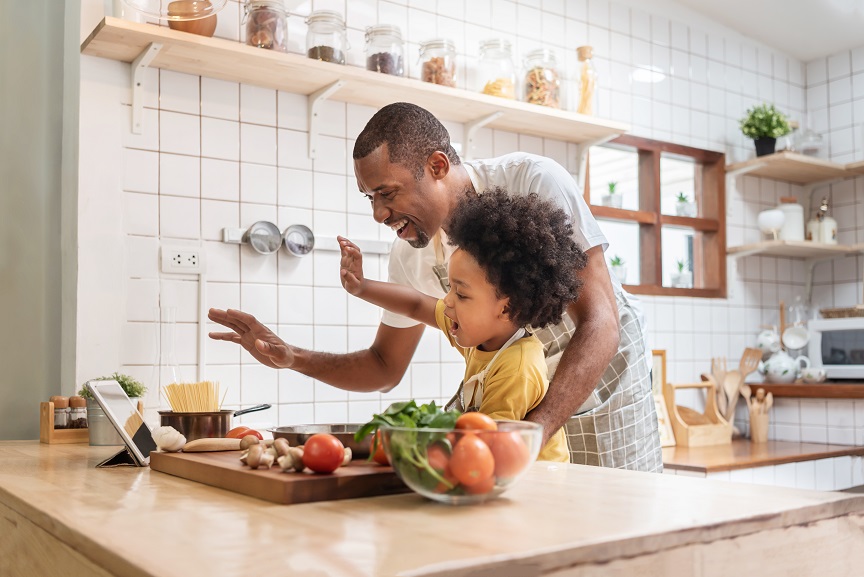When your schedule gets hectic, the kitchen can be one of the last places you want to be. Whether you feel too tired, stressed, or stretched for time, cooking often doesn’t remain a priority. But have you taken a moment to fully explore the benefits of planning and preparing your own meals? It’s worth the time! From saving money to spending quality time with family and even fighting cognitive decline, preparing your meals at home is a recipe for success.
Save Money by Preparing Your Meals
On average, Americans go out for lunch twice a week and spend $10 each outing. That adds up! According to the Bureau of Labor Statistics, the average American household spends over $3000 each year dining out. Packing a lunch is the easiest way to alleviate this. Luckily, the Internet is full of budget-friendly (and healthy!) lunch and dinner recipes that will satisfy your hunger without breaking the bank. When deciding to bring your lunch to work, plan your meals for the whole week. By cooking in bulk, your meals’ cost per serving decreases, and you limit the impact on your utility bill.
Tip: Choose non-prepared fruits and vegetables when perusing the produce section. Doing your own slicing and dicing will save you money in the long run!
Cooking at Home is Good for Your Health
The Problem with Fast Food
When you know what ingredients are going into your meals, you have more control over the nutrients you’re allowing into your system. On the other hand, fast food has high amounts of sodium, saturated fat, trans fat, and cholesterol, which, when consumed too frequently, can lead to a plethora of health issues. Servings at restaurants tend to be supersized and, on average, are 2-3x larger than recommended portion sizes. The typical fast-food order ranges between 1,100 to 1,200 calories total – that’s almost all of a woman’s recommended daily calorie intake (1,600 to 2,400 calories) and nearly two-thirds of a man’s daily intake (2,000 to 3,200 calories). You may feel pressure to clear your plate when dining out, which adversely affects your blood pressure, risk of diabetes, and waistline. According to Healthline, people who frequently eat fast food are also 51 percent more likely to develop depression.
Benefits of Preparing Your Food
However, studies have shown many positive psychological benefits from cooking. Cooking is an outlet for creative expression; it can help fight cognitive decline, is a way to practice mindfulness, and is even a source of nurturing when cooking for others. You have more control over your nutrition when you prepare your own food, making it easier to consume fresh, healthy, wholesome meals. This can boost your energy, stabilize your weight and mood, and even improve your weight and resilience to stress. The USDA’s MyPlate program offers quick resources and tips toward making healthier decisions when it comes to meal planning.
Tip: Cooking doesn’t need to be complicated! The cornerstone of a healthy diet consists of unprocessed food with plenty of vegetables and protein. There’s no need to follow complex recipes- the simplest meals can be the tastiest! Try steaming or sautéing veggies, grilling chicken or fish, and adding herbs, spices, or sauce.
Develop Strong Social Connections with a Home-Cooked Meal
Make Cooking a Family Activity
Preparing a delicious meal to share with friends or family can be empowering, boosting your mood and self-esteem! It offers opportunities to spend time with your social circle, creating strong bonds and a sense of connection. Cooking can become a family activity from start to finish. Extra hands in the kitchen can help the time fly and can even cause the kitchen to become an environment for teaching and learning — you can learn something from your significant other, or children could get their first lesson on cooking.
Enjoy the Meal Together
Once your food is prepared, sit down to enjoy a meal together. This time with one another provides an opportunity for everyone to unwind their day, sharing updates about work or school. Switch off the screens and focus on enjoying the time together. Screen-free time lessens distractions, making mindless overeating less likely. Once the meal is over, clean up together. This helps a not-so-fun task end sooner and reinforces a sense of helpfulness in children. Be on the lookout for local (and online) cooking classes and workshops. Learning new skills in the kitchen can only increase your confidence and enjoyment when it comes to cooking.
Not a Chef? Not a Problem!
Cooking classes not your thing? Head to your nearest farmer’s market with your family or friends to do some grocery shopping. You will find delicious ingredients for your meals and feel good supporting local producers with your purchases. That is a healthy win-win for everyone!
Tip: Reframe how you think about cooking. Rather than lamenting another task, realize it can be a pleasant and relaxing experience. Split responsibilities like grocery shopping and cleanup duties with your partner or roommate to help speed things up.
Listen to Related Podcast: Good, Better, Best: Eating Made Easy: In celebration of National Nutrition Month we sit down with Susie Roberts, RDN, LD and the recipient of the Iowa Academy’s 2021 Emerging Dietetics Leader Award to debunk some common nutrition myths and misconceptions. We cover everything from intermittent fasting to how important breakfast really is to supporting gut health. In addition we discuss the importance of knowing where you get your nutrition information.

